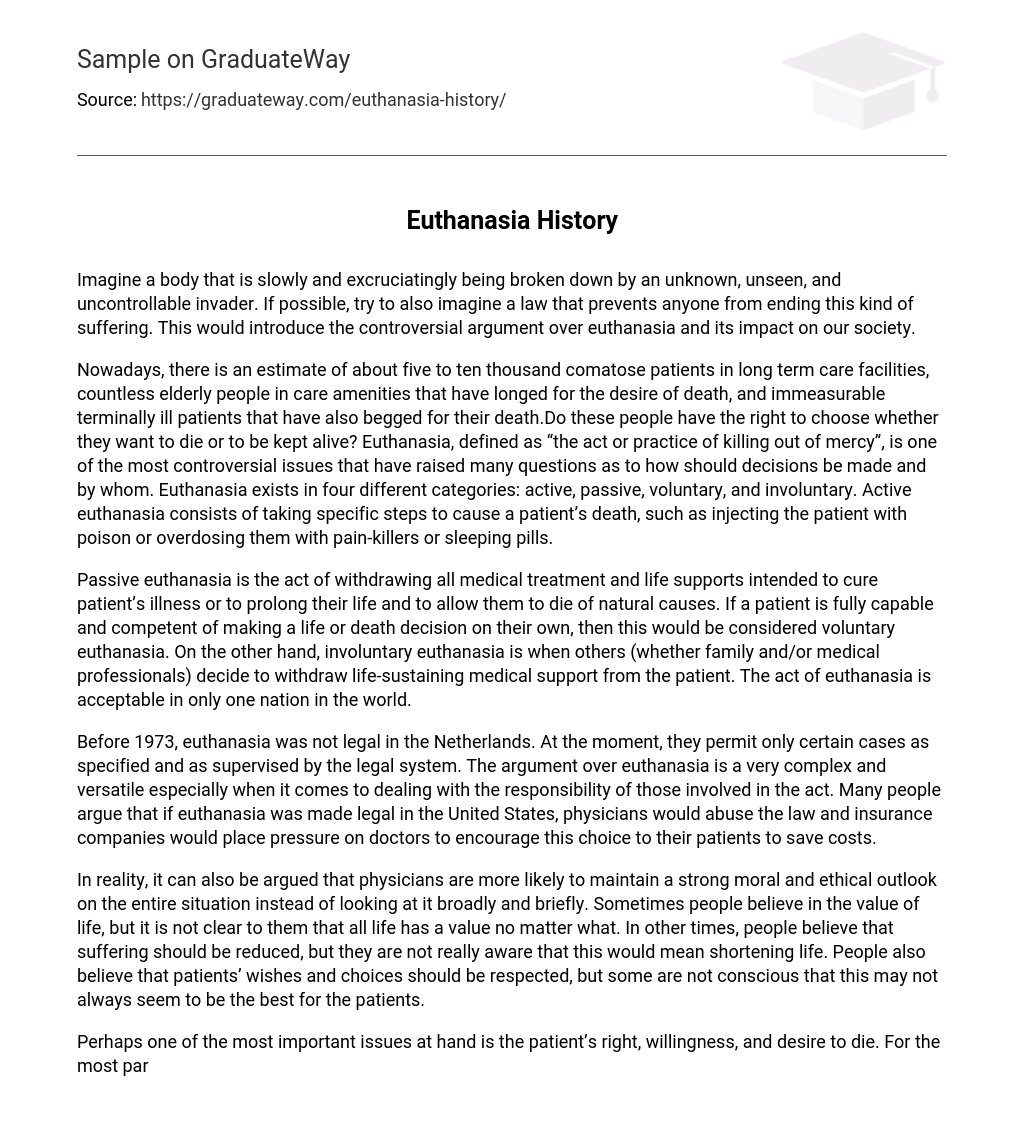Imagine a body that is slowly and excruciatingly being broken down by an unknown, unseen, and uncontrollable invader. If possible, try to also imagine a law that prevents anyone from ending this kind of suffering. This would introduce the controversial argument over euthanasia and its impact on our society.
Nowadays, there is an estimate of about five to ten thousand comatose patients in long term care facilities, countless elderly people in care amenities that have longed for the desire of death, and immeasurable terminally ill patients that have also begged for their death.Do these people have the right to choose whether they want to die or to be kept alive? Euthanasia, defined as “the act or practice of killing out of mercy”, is one of the most controversial issues that have raised many questions as to how should decisions be made and by whom. Euthanasia exists in four different categories: active, passive, voluntary, and involuntary. Active euthanasia consists of taking specific steps to cause a patient’s death, such as injecting the patient with poison or overdosing them with pain-killers or sleeping pills.
Passive euthanasia is the act of withdrawing all medical treatment and life supports intended to cure patient’s illness or to prolong their life and to allow them to die of natural causes. If a patient is fully capable and competent of making a life or death decision on their own, then this would be considered voluntary euthanasia. On the other hand, involuntary euthanasia is when others (whether family and/or medical professionals) decide to withdraw life-sustaining medical support from the patient. The act of euthanasia is acceptable in only one nation in the world.
Before 1973, euthanasia was not legal in the Netherlands. At the moment, they permit only certain cases as specified and as supervised by the legal system. The argument over euthanasia is a very complex and versatile especially when it comes to dealing with the responsibility of those involved in the act. Many people argue that if euthanasia was made legal in the United States, physicians would abuse the law and insurance companies would place pressure on doctors to encourage this choice to their patients to save costs.
In reality, it can also be argued that physicians are more likely to maintain a strong moral and ethical outlook on the entire situation instead of looking at it broadly and briefly. Sometimes people believe in the value of life, but it is not clear to them that all life has a value no matter what. In other times, people believe that suffering should be reduced, but they are not really aware that this would mean shortening life. People also believe that patients’ wishes and choices should be respected, but some are not conscious that this may not always seem to be the best for the patients.
Perhaps one of the most important issues at hand is the patient’s right, willingness, and desire to die. For the most part, the death of an individual should be left in the hands of the person that is suffering. All people die and everyone lives with the truth that life is under the sentence of death. There will always be a question involved in the contemporary debate about euthanasia because this issue concerns the morality of mercy in helping a dying patient.
Dying is not something that any of us really look forward to, but it is a natural process and when we are aware of the time limit that we have, we try to make the best out of it knowing that it is the last chance to become the best of ourselves. Euthanasia refers to choosing a dignified death, rather than one that is set for the individual, where all pains and suffering can be terminated. When palliative and sedative care is no longer an option and treatments have failed over and over again, the option to choose a good death should remain open at all times.Even though the name euthanasia shows lack of responsible actions that are going to be taken, the act itself will and should always be a personal choice based on the amount of suffering one is willing to allow themselves to go though.
Euthanasia will always be in existence and it will most likely never stop being a controversial issue. As far as the government is concerned, it is merely a choice of making it either ‘acceptable’ or ‘unacceptable’, but in the end… whose life is it anyways?





